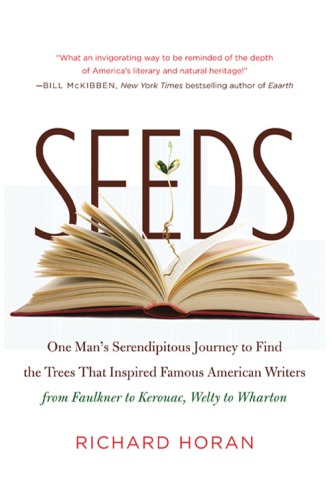
Seeds
One Man's Serendipitous Journey to Find the Trees That Inspired Famous American Writers from Faulkner to Kerouac, Welty to Wharton
کتاب های مرتبط
- اطلاعات
- نقد و بررسی
- دیدگاه کاربران
نقد و بررسی

May 2, 2011
"My cockamamie scheme...I would go around the country collecting tree seeds at the homes of famous people I admired, grow them into saplings, then buy a cheap parcel of land and plant them there." So begins Horan's whimsical journey, which quickly evolves into the focus for a new book (after the novel Goose Music). Though the repetitive, sometimes sweeping pattern of traveling, researching, gathering, and briefly recounting tidbits may not awaken new interest in the chosen authors' lives, and though tepid reflections ("Edith Wharton was filthy rich, and she sure could write one hell of a story"; "Henry Miller was the writer who...saw the truth of life") don't elucidate why particular icons have influenced Horan, his enthusiasm propels the book. Read as the tale of an amateur naturalist's road trip rather than as a curious, profound homage to literary giants, Seeds carefully reminds us of landsâand homesâthat are worth preserving, provoking questions of legacy. Trees become lodestones for memory, charged with history and grandeur, and Horan concludes his project in a particularly inspiring way, emphasizing how the merest "seed" of an idea can flourish with perseverance.

March 1, 2011
Novelist Horan (Goose Music, 2001, etc.) travels around the country gathering seeds dropped by trees standing on land of literary, historical, musical or military significance.
The author, a feckless though exuberant tour guide, repeatedly arrives at an author's home (the Scott Fitzgeralds' in Montgomery, Ala.; the Faulkners' in Oxford, Miss.) only to find it's closed. Sometimes, he pops onto the property anyway, a latter-day acorn-gatherer, his endless supply of Ziploc bags at the ready. Later, at home, he tries to urge his seeds, with mixed success, into germination and growth. Horan seems to know little about some of the writers he intends to honor, a notable exception being Thomas Wolfe; he makes some stunning errors—attributing one lovely epigraphic quotation to Kate Chopin's The Awakening (it's from her story "Mrs. Mobry's Reason"), then a few pages later, while sauntering down Esplanade in New Orleans, fails to mention that tree-lined street is a major setting for The Awakening. The author is merciless about docents and neglects to extract from his prose dozens of clichés. After reading that Horan gets a "lump in my throat," sees a "face lit up like a Christmas tree" and experiences a "magical moment," readers may wish that he had learned more about fresh language from those graceful writers whose trees he adores. However, the author offers some effective moments, too. He notes with authentic disgust the mostly Caucasian staff at Mt. Vernon, and he is outraged about the decision of the National Park Service to clear majestic trees from Gettysburg to make the battlefield look more "authentic."
A dazzling diamond of an idea set in a ring of straw.
(COPYRIGHT (2011) KIRKUS REVIEWS/NIELSEN BUSINESS MEDIA, INC. ALL RIGHTS RESERVED.)

April 15, 2011
You need the subtitle to understand the intent here. Novelist Horan (Goose Music) traveled to various regions in his quest and visited the homes of both literary and historical figures, such as Eudora Welty, Robert Frost, and Thomas Jefferson. He posits the influence of the trees at these homes, whether as subject matter or vantage point. His rationale for then collecting seeds from these trees and trying to propagate them is a little less clear. The illustrations (by his sister and nephew) of the leaves of the various trees are a lovely addition. Horan is evidently a raconteur: readers may pick up a few interesting tidbits and political parallels about the famous writers, but often Horan simply comes across as chatty and self-indulgent. It's as if he has taken this journey as a way to expound on his own philosophy and approach to life rather than on that of the famous figures. VERDICT This is a light read, but for whom? An optional purchase.--Gina Kaiser, Univ. of the Sciences Lib., Philadelphia
Copyright 2011 Library Journal, LLC Used with permission.

























دیدگاه کاربران